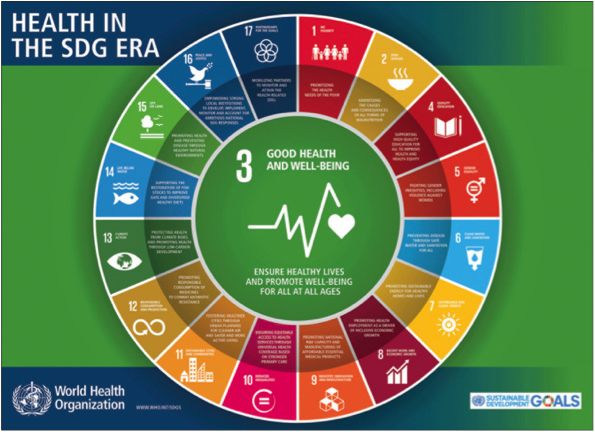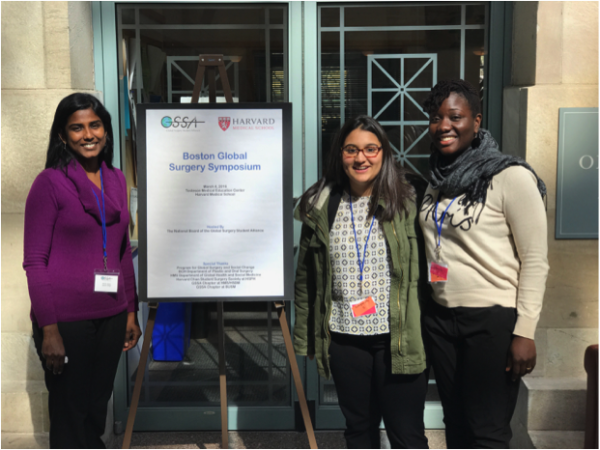Entrepreneurial Opportunity Amidst One of the World’s Largest Challenges
I had the privilege of attending the Boston Global Surgery Symposium held at Harvard Medical School on March 4th with a few of Babson’s curious and bright students. The Schlesinger Fund for Global Healthcare Entrepreneurship (GHE) sponsored their attendance. As Assistant Director of GHE, I am devoted to providing and creating learning opportunities for our Babson students whether these opportunities are via our on-campus events, international learning experiences, or external events, and this was one not to be missed.
The world is finally embracing the fact that today’s challenges need a multidisciplinary approach. Of the 17 UN Sustainable Development Goals (SDGs), the work that we are doing at GHE corresponds primarily to SDG Number 3: Good Health and Well-Being. However, as the below graphic from the World Health Organization clearly illustrates, there are so many ways in which this SDG touches other sustainable development goals addressing other global challenges and how these goals in turn touch global health.

At Babson, and more specifically GHE, we have an important role to play in ensuring that we facilitate the cross-pollination of our students at local and international academic institutions. Students in business, engineering, medicine, art, design, and other disciplines all need to connect to think holistically and systemically about the challenges at hand in global healthcare systems in resource constrained regions of our world. The experience at Harvard Medical School has clearly planted seeds in the students who attended to do just that. Read their insights and takeaways below, and check out the live stream recording of the conference. I’m looking forward to opportunities to sow more seeds.
Many people may think that global health is unrelated to business. This is far from true. From this event, I realized there is a huge space for entrepreneurial mindsets. Figuring out sustainable practices and innovating ideas and systems is all a part of Babson. More students should come out to these events. There is so much to learn.
– Saloni Sharma ‘20
One statistic stood out to me; by 2030 the cost of surgical expansion needed would cost about $350 billion but the cost of failure to address this need would be an estimated $12.3 trillion in total GDP losses. This illustrated the importance of investing in robust healthcare systems especially in resource-constrained economies.
The three delays in patient care that were presented at the symposium is a simple framework that can be used to identify the opportunities for entrepreneurial business solutions. The first delay is in seeking care. The second delay is in reaching care and the final delay is in receiving care. Each delay steps through the different stages in a patient’s healthcare journey. The coordination and function of many services ranging from transportation to finance is required to successfully address these delays.
The symposium raised more questions than it answered. One of them was, “How can I contribute to global surgery as an MBA student?” In the true Babson Entrepreneurial Thought & Action ® spirit, I decided to start with what I have. With my medical training and professional network in India combined with my Babson training, I hope to be of service to this much-needed effort.
– Sthuthi Jebaraj, GHE Grad Assistant & MBA’18
Having little background in healthcare, I came to the Global Surgery Symposium with fresh eyes. My aim that day was simply to understand what global surgery actually was and what the implications to the world are. I left the event with a greater appreciation for just how important entrepreneurial thinking is.
Dr. John Meara, the Chair of the Lancet of Commission of Global Surgery, presented compelling facts on the opportunities and challenges facing the field of Global Surgery (watch a short video on global surgery here). For instance, he shared that if a medical unit is able to learn how to properly execute just three specific surgeries: cesarean, laparotomy and open fractures, statistically the overall surgical unit performance for all procedures is likely to increase. This is because those surgeries cover almost any elements the doctors would encounter in other surgical procedures. Yet, what use is it to cultivate such high standards of care if patients still face the three delays, or are subject to financial ruin from the costs of the procedures as is so common in a low and middle income country?
I made my way to two workshop sessions afterwards: Education and Capacity-Building & Crisis and Humanitarian Aid. The former revealed that we need to reconsider training approaches for personnel from developing countries. We should train personnel within their contexts. Coming from a developed country, we often barge into developing countries – be it at hospitals, businesses, NGOs – giving them aid in ways that are not needed. Humility is so key to success. Healthcare providers in low-income countries are doing the very best that they can. We need to understand their goals, not ours, and match our resources to their needs.
The Crisis and Humanitarian Aid session presented a grim reality of what healthcare often actually looks like in a war-torn or natural disaster devastated area: doctors and nurses working under dire situations to help save others who live in even more dire situations, doctors performing emergency surgeries that they have minimal experience with, and headlamps often regarded as a holy grail in surgery rooms as electricity is often not available.
There is still so much to be done. Though it is not a panacea, I truly believe innovation and local entrepreneurship needs to remain part of the picture. We need to equip everybody in all fields and communities with the basic systematic framework of innovation and entrepreneurship. People immersed in their context often know how to meet their own needs best. And if more have these tools to act on their individual and collective knowledge, we as a whole can achieve more.
– Wei-Ning (Dennis) Huang, MSEL‘17

Left to Right: Sthuthi Jebaraj, Saloni Sharma and Rebecca Obounou at the Boston Global Surgery Symposium at Harvard Medical School.
